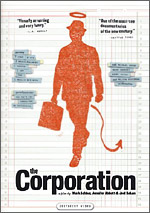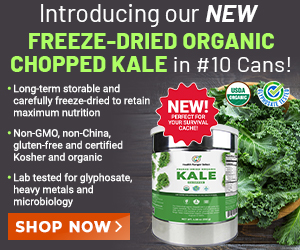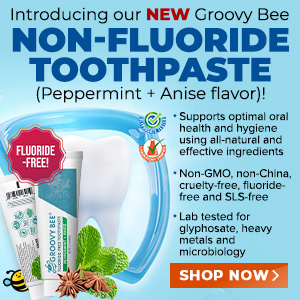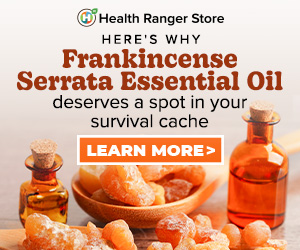
Eye-opening documentary "The Corporation" reveals the true evils behind some Big Business companies
 Wednesday, March 22, 2006 Wednesday, March 22, 2006by Mike Adams, the Health Ranger Editor of NaturalNews.com (See all articles...) Tags: The corporation, whistleblowers, FDA reform |
- Pfizer faces legal backlash: Texas, Kansas, and more states begin to challenge Prep Act Immunity Shield
- Maple syrup: Nature's golden superfood and its sweet health benefits
- Manufacturing surge under Trump sparks optimism amid concerns over economic strains
- Florida sky mystery: Toxic heavy metals and bioengineered particles found in air and food samples
- Omega-3s: a powerful ally in the fight against chronic inflammation
- Possible biosignatures detected on Exoplanet K2-18b, raising hopes for alien life
- Aerosolized bioweapons? Strange “diploid biomasses” falling out of the sky in Florida captured under the microscope
- Controversy over $400K fund for Texas killer's family sparks outrage: Legal, ethical questions emerge
- HHS Secretary Kennedy will likely investigate the following environmental exposures as CAUSES OF AUTISM and brain damage in children
- Majority of Americans now favor mass deportation of illegal immigrants, polls show shift in public sentiment
- U.S. demands U.K. protect FREE SPEECH, repeal hate speech authoritarianism, in latest trade deal negotiations
- Analysis: The coming economic collapse, a mass uprising and Trump's three secret weapons to halt the growing revolt
- Russia escalates censorship war, targets over 200 VPN apps amid Google resistance
- Cruciferous vegetables deliver TRIPLE the heart benefits than previously known, study reveals
- TAKE IT DOWN Act advances in Congress amid free speech concerns
- Trump's bold trade overhaul reaches a crossroads with Italy, as "fair deals" promise sparks global attention
- “Green Energy Genocide”: Allan Malcolm MacRae’s controversial challenge to the climate change narrative
- BlackRock's Panama port deal stirs debate over Chinese chokehold on strategic shipping routes
- Aerosolized bioweapons? Strange “diploid biomasses” falling out of the sky in Florida captured under the microscope
- Analysis: The coming economic collapse, a mass uprising and Trump's three secret weapons to halt the growing revolt
- Widespread social and economic unrest: Steve Quayle issues urgent financial warning of imminent asset collapse in new interview with Mike Adams
- TAKE IT DOWN Act advances in Congress amid free speech concerns
- Israeli lobbyists boast of controlling US national security policy in leaked AIPAC audio
- Kiss Your Genetic Privacy Good-Bye! 23andMe Gets Green Light to Sell Your Intimate Genetic Details to Anyone They Want
- Mike Adams releases country western hit single: Goin’ Back in Time is Comin’ Home
- U.S. lawmakers investigate Meta over alleged China collaboration
- CLOT SHOT PLANDEMIC UNFOLDING: Fibrous, rubbery clots caused by covid injections have prion-like seeding activity
- Fauci is back in the limelight, and he’s busy promoting a future COVID or FLU pandemic
- Defunding DEADLY mRNA jabs: Government funding for mRNA technology being scrutinized and sidelined until proven "safe and effective" for real
- Russia escalates censorship war, targets over 200 VPN apps amid Google resistance
- Curcumin’s ancient healing power supercharges muscle recovery, and its effects are compounded with anti-inflammatory foods and supplements
- I Want My Bailout Money – new song and music video released by Mike Adams
- I Want My Bailout Money – new song released by Mike Adams
- Government waste exposed: Hegseth supports Musk’s demand for accountability from federal workers
- U.S. approves new Russian ambassador as diplomatic thaw continues
- Federal employees whine over DOGE's new directive requiring them to do a 5-point summary of weekly accomplishments
- Newly released JFK files reveal Pentagon's role in creating Lyme disease and covid in the same lab
- Analysis: The coming economic collapse, a mass uprising and Trump's three secret weapons to halt the growing revolt
- Aerosolized bioweapons? Strange “diploid biomasses” falling out of the sky in Florida captured under the microscope
- Kiss Your Genetic Privacy Good-Bye! 23andMe Gets Green Light to Sell Your Intimate Genetic Details to Anyone They Want
- Mike Adams releases country western hit single: Goin’ Back in Time is Comin’ Home
- European Court of Justice: Healthcare professionals who promoted or administered COVID-19 vaccines are CRIMINALLY LIABLE for any harm caused
- Widespread social and economic unrest: Steve Quayle issues urgent financial warning of imminent asset collapse in new interview with Mike Adams
- Federal employees whine over DOGE's new directive requiring them to do a 5-point summary of weekly accomplishments
- U.S. approves new Russian ambassador as diplomatic thaw continues
- CLOT SHOT PLANDEMIC UNFOLDING: Fibrous, rubbery clots caused by covid injections have prion-like seeding activity
- Government waste exposed: Hegseth supports Musk’s demand for accountability from federal workers
- I Want My Bailout Money – new song and music video released by Mike Adams
- I Want My Bailout Money – new song released by Mike Adams
- Fauci is back in the limelight, and he’s busy promoting a future COVID or FLU pandemic
- Defunding DEADLY mRNA jabs: Government funding for mRNA technology being scrutinized and sidelined until proven "safe and effective" for real
- Trump administration poised to overhaul crypto regulations with new SEC leadership
- Now you can HEAR chemistry: Health Ranger translates molecules into music in stunning video demonstration that will blow your mind (and your ears)
- South Carolina Congressman proposes new $250 bill and wants Trump on the front
- Red Cross issues warning to stop blood plasma donations from vaccinated people
- Scientists confirm: GENIUS brain function can be spontaneously unleashed in humans without any apparent cause
- EPA advisor admits the agency is funneling billions to climate groups ahead of Trump’s return to White House
- HYSSOP: What research reveals about the health benefits of this ancient holy herb
- Two containers with completed ballots fall out of truck in Florida
- Newly released JFK files reveal Pentagon's role in creating Lyme disease and covid in the same lab
- Mike Adams releases country western hit single: Goin’ Back in Time is Comin’ Home
- Global leaders unite to clamp down on “misinformation” with UN-backed Cascais Declaration
- BREAKING: 2025 NDAA authorizes mandatory military draft of WOMEN across America… as Pentagon pursues global NUCLEAR war with both Russia and China at the same time
- I Want My Bailout Money – new song released by Mike Adams
- Michael Yon warns of a ZIONIST TAKEOVER in Trump’s second administration
- The Health Ranger releases “Vaccine Zombie” song and music video, using AI-animated zombies for the music video
- Ozempic and Wegovy weight loss drugs are injectable LIZARD VENOM PEPTIDES that may unleash a devastating wave of organ failure… side effects align with symptoms of SNAKE BITES
- BOMBSHELL: DNA testing kits are a SCAM to develop ethnic-specific bioweapons
- Israeli soldiers accused of even more torture and abuse in the West Bank
- These 13 countries just signed an agreement to engineer a global FAMINE by destroying food supply
- RFK Jr. clears key hurdle: Sen. Susan Collins backs controversial HHS nominee, signaling a new era for health policy
- NASA admits that climate change occurs because of changes in Earth’s solar orbit, and NOT because of SUVs and fossil fuels
It's important for me to note that I, personally, am not anti-corporation. Yet, this film has really helped me understand some big issues that I have been struggling with for a long time. Most notably, it addresses the issue of how a corporation can conduct so much evil and cause so much pain, suffering and even death in the world -- not just at the individual level but at the global level -- and yet be staffed by normal, nice people who have ethics; everyday men and women. How can a corporation be so evil when its people are not so evil? How does that work? This film has really helped answer that question for me, which is one of the main reasons why I recommend watching this, because it gives a new education on where a corporation comes from, and how it gets out of control.
What we find is that corporations become monstrosities. They become self-feeding entities with one purpose in life, and that is to grow and survive. It's sort of like that alien plant in the Little Shop of Horrors -- it just wants to grow, and it says, "Feed me, feed me." Every corporation has one purpose, and that is to provide value and profits to its shareholders while continuing to grow. In fact, as you'll see in The Corporation, that is by law the growth strategy that every corporation must follow. By law, corporations must put the profits of shareholders first and, in doing so, will necessarily export its problems to the public at large. In the video, these are called "externalities," and corporations are machines that will externalize the costs of their endeavors to society and to the planet.
For example, junk food companies externalize the costs of health care associated with the long-term consumption of their products. They sell products to consumers, then consumers eat the products, get diseased, have long-term healthcare costs, loss of quality of life and possibly require huge surgical procedures and so on, but these costs are not borne by the corporation, they are borne by the consumers; the people. So, this video really helps answer some of these questions as to how these corporations get wildly out of control and become these self-perpetuating, evil machines that really have no purpose in the world other than to make sure they survive and grow.
One of the interesting things about this documentary -- and perhaps one of the criticisms, if I may offer one -- is that the same is true of really any organization. It doesn't have to be a corporation. Remember, a corporation is a legal entity, but much the same goes on with federal regulatory agencies like the FDA and USDA. These organizations created by the federal government -- which is supposed to be created by the people -- really have no purpose other than to survive and grow and accumulate more power. We see the same thing in various nonprofit organizations, as well. Many nonprofit disease organizations have no other purpose but to survive, grow, make more money and have more influence. Oftentimes, the way they do that is by selling out to the very companies that cause the same diseases the nonprofit organizations claim to fight.
For example, the American Diabetes Association takes money from the world's third-largest manufacturer of soft drinks and candy. Here's an organization that's supposed to be fighting diabetes, and it's taking money from a company that sells products that any nutritionist would agree contain ingredients strongly correlated with the promotion of diabetes and obesity. It does that because it needs to thrive and survive. It needs to grow and extend its influence. It's not that the people in that organization are evil; it's that the organization itself has no other purpose than to survive and extend its influence in the world. These concepts are covered in quite a bit of detail in The Corporation, which is why I strongly recommend you go out and rent or buy this video and see it for yourself. It's very well done, and it has a lot of intelligent people talking about the subject and really explaining how corporations get out of control.
You'll also see some rather shocking images in this documentary of some of the effects of corporations getting out of control -- environmental effects and cruelty to animals in the dairy industry, for example. You will see how they treat pigs, and you'll see how they treat other human beings in developing nations or underdeveloped nations. You will see how these corporations treat their customers and how they treat the planet. Some of these images are quite shocking and disturbing. Yet they demonstrate one thing -- that corporations are capable of these great acts of evil, even when human beings that run these corporations are not. And that's fascinating because it's a form of mental illness, and this is explored in The Corporation, as well.
Corporations are people, too; specifically, they're psychopaths
The corporation itself is called a person in society. From a legal perspective and a regulatory perspective, a corporation is considered a person. So, this film asks, "If a corporation is a person, what kind of a person is it?" As it turns out, it's the type of person who has no regard for the safety of others -- the type of person who is unpredictable and who harms society, the environment and the people around him or her. Basically, if you go down through the checklist, it's the kind of person who is classified as a psychopath. And this is the mental characteristic of the corporation. It is psychopathic in a technically defined mental disorders kind of way. If you look at how corporations act, they are psychopathic.This helps explain why companies like the big pharmaceutical firms can continue to market and sell products that they know, literally, kill people, and yet can manage to keep them on the market year after year because they're generating profits. This is how a food company can manufacture food products that cause birth defects; that destroy the nervous systems of fetuses; that have helped create a nation of children with so-called learning disabilities, or attention deficit hyperactivity disorders; and children with nervous systems that have been compromised due to the nutritionally depleted foods that are sold in every grocery store in America and around the world. This is how it happens. These corporations are in charge, not their people, and these corporations must survive and thrive and generate profits. That is how these atrocities are taking place today.
Watching this documentary, you might say it has a sort of an anti-trade slant to it. Some people might say this is a very economically leftist kind of documentary that is against world trade or, perhaps, free trade. I don't view it that way; I think it tells a side of the story that needs to be told and that it raises some very valid points. But I have to ask myself: What good are corporations accomplishing, if any? Is there a useful purpose behind some corporations? What's going on with free trade and the World Trade Organization?
Real free trade can prevent wars; protectionist attitudes can cause them
I've received a lot of e-mails asking my opinion on these matters and, to some degree, my opinion might stray from most of the opinions of the readership of this site, but here's my view on it: If you want to make war impossible between any two countries, one way to do it is to make sure those countries have so much cross-investment in each other that war would be unprofitable. You see this in China and Taiwan; this is a region of the world that I watch very closely, and we see that China is always threatening Taiwan with war. China continues to see Taiwan as a renegade province, and Taiwan, of course, is an independent country by any definition; it has just failed so far to declare its independence, even though it operates completely independently from China.There's been military and political tension between these two countries for a long time, since the late 1940s when Chiang Kai-shek and his allies left the mainland China and came to Taiwan. Over the last decade, though, we've seen huge cross-investment between the two countries. We've seen businesspeople from Taiwan going into China and setting up factories. There's a huge outsourcing of labor from Taiwan into China, where they're using cheap, mainland Chinese labor to build physical goods, computer components, electronics and so on, and as a result, this trade is opening up new avenues of potential peace between these two countries. It's opening up the possibility that perhaps someday these two countries will merge and become one, and they will become stronger from doing so.
Now, of course that won't happen in the current political climate, but things could evolve in that direction. In the meantime, this trade is preventing war. Why? Think about who makes the decisions about war in any country -- it's the top leaders of that country. It's the people who are also at the top of the chain in the business system. The same is true here in the United States. The people declaring war in this country are the exact same people who own, run and sit on the boards of the top businesses in this country, and those individuals only decide to go to war when it is profitable to do so. It was profitable for these individuals to declare war on Iraq because we didn't have any trade with Iraq, and Iraq had a very valuable resource -- oil. Now, anybody who imagines the war on Iraq is not about oil is a complete fool; of course it's about oil. You didn't see the U.S. jumping into Rwanda to save a bunch of lives and restore democracy. Why? No oil in Rwanda, right? There's oil in Iraq.
But back to China and Taiwan, war is prevented by cross-investment because everybody's making so much money out of these factories. Taiwan businesspeople are making money, Chinese businesspeople are making money, Chinese politicians are making money, and Chinese police are making lots of bribery money because you've got to bribe the right people to do business in China. So, there's no profit in war. If you go to war, you spoil the economic profit that's there.
Now, back in the United States, let's say Donald Rumsfeld, for example, owned a chain of factories in Iraq before 2001. Let's say he owned a chain of factories where people were making all kinds of products that were being exported, and let's say these factories were generating a couple of billion dollars in profit every year. Would we have gone to war with Iraq? I very much doubt it, because when there's trade and business happening between two countries, war messes with the profits. Whenever you see two countries trading a lot, you don't see wars between them.
The only time there is war is when there is a lot of protectionism and countries isolating each other. Right now, the United States is in a scary, protectionist kind of phase. We want to protect our borders from any free trade. The FDA wants to protect us from lower-priced prescription drugs from other countries. U.S. automobile companies are in the dumps and GM, the U.S. flagship automobile company, is about to declare bankruptcy, in my estimation. This company is going to be screaming for protectionism because they can't compete with companies like Toyota, so they're going to want to be protected. The U.S. is erecting a whole lot of barriers right now. It doesn't want to compete in the global marketplace. It doesn't want to compete with smart people in India who will do accounting or computer programming for a fraction of the price of U.S. programmers. It doesn't want to compete with telephone conference people and call center people in countries around the world. It doesn't want to compete with car manufacturers from Japan. It doesn't want to compete with textile manufacturers in other parts of the world. The U.S. is in a very protectionist kind of phase, and wherever you have protectionism, you end up with war.
We're seeing this in the United States right now. There is lot of trade constriction, protectionism and war going on at the same time, and with all that comes a loss of personal privacy and a shift toward a police state. We're seeing all of that happen right here in the United States under the Bush regime -- lots of war, military action, protectionism and a loss of privacy and basic human rights.
So, I am actually a huge proponent of free trade without all the profit mongers involved. I'm a proponent of fair trade, which is free trade between two countries where the people doing the work can make an honest living. I believe any time you have two populations trading goods and services, even if there's a disparity between the labor costs of one country and another, you can still serve the common interests of both countries by specializing in labor in one case and specializing in consumption in the case of U.S. consumers. You can still serve the common good. So, I'm a huge proponent of free trade or fair trade practices, such as fair trade coffee, for example. Fair trade is a big part of the organic food movement.
Now, I know a lot of you are saying that I'm confusing free trade and fair trade, but actually, I'm not. I'm sort of using them interchangeably for a specific reason. When the people in charge of the world say free trade, they don't really mean free trade. But when I say it, I really do mean free trade. I mean free and open borders with economic prosperity between two trading partners and without influence of the people who always have their fingers in everything -- the people who make the big decisions about who goes to war, which corporations are going to come in and invade a country and so on. You know who I'm talking about -- the top people who run the top banks, top corporations and top governments around this world. When they get involved, everything gets messed up. What I'm talking about is free trade without those disaster creators. I'm talking about free trade between everyday people. I'm talking about the kind of free trade where you go to a farmer's market on the weekend and you trade some dollars for some potatoes or some green beans or something. I'm talking about person-to-person trade between two countries, where everybody benefits.
This system of trade enhances the quality of life for everyone, until you get all these people involved who run the corporations and run the governments of the world, and they want a piece of the pie. A lot of times, I see the term free trade being used just as a front to allow U.S. corporations to come in and invade a society and say, "Well, we've got to have a McDonald's here and we've got to have U.S. banks here, so that we can financially exploit this country." Politicians call that free trade, but I call that exploitive trade. So, when I say free trade, I'm talking about legitimate free trade that is free of the criminal influence or the political influence of these corrupt individuals who seem to be running everything in the country and around the world. And of course, I'm a big proponent of fair trade as it is known in the organic industry.
Here's a wacky idea: When corporations serve their purpose, they should dissolve
What does all this have to do with The Corporation? Well, I'm just trying to point out that I'm not against the idea of a corporation, although this documentary has certainly given me a fantastic education in how these corporations get out of control. I think the solution here is having corporations with specific missions and time limits, so that, in a sense, every organization should self-destruct when it accomplishes its mission. It should dissolve itself.There's a crazy idea, right? What do you say we have a non-profit and then when the non-profit accomplishes its mission, it's complete? It's done. The non-profit is over with. Now, let's say you have a disease organization like the American Cancer Society -- wouldn't it be great if the American Cancer Society had as its mission the curing of cancer, and then it would self-destruct? That's what it should be, but I don't think that's part of the articles of the non-profit incorporation for the American Cancer Society. I think this organization and all the other disease organizations out there are really just perpetuating their own existence, and if you are a disease organization, you do that by perpetuating the disease.
If you're a cancer association or a diabetes association or an Alzheimer's association and you cure the disease, you're out of work. I've talked about this before. This is why I don't believe any of these organizations really have curing these diseases as their top priorities. I think they have disease management as their top priorities. I think they have diagnosis and treatment of these diseases as their top priorities, and this is why they get so much funding from pharmaceutical companies, because treatment involves drugs. Cures don't. If you found the cure for cancer, you would destroy the cancer industry in this country, and it is a multi-billion dollar industry.
So, I think that every organization should have a roadmap to its own completion of its important goals. It's sort of like term limits on corporations, non-profits or government institutions. For example, let's say that every four years, everybody who worked at the FDA was fired, and you had to get a whole new FDA. Well, then you wouldn't get a whole lot of corrupt officials because every four years, you'd have new people coming into office. That way drug companies couldn't manipulate one individual and count on that individual staying in charge for a decade or more. Now, certainly you could still have corruption; it would just be harder to accomplish. You'd have to re-corrupt everybody every four years. That's not impossible to do, and we certainly see it in Congress, but it's a little more difficult than just corrupting one guy and hoping he stays in power.
The corporation, as a legal entity, definitely has a place in society and perhaps even a constructive place. There are a lot of economic benefits that we would not experience today if it were not for corporations -- if it were not for a group of people working together toward one common goal. However, we need to rethink what's happening to these corporations. Corporations are running the world today. Corporate influence is running our governments. Do you think people who are just looking to protect public health run the FDA? Give me a break. Those corporations that influence the FDA's regulatory decisions run it. Do you think people who represent the public run our government? Give me a break. Our government is run by corporate interests, and it is these corporate interests that make all the decisions about environmental law, war and all kinds of legal reforms that benefit the business community, like making it more difficult for consumers to file bankruptcy or making it illegal for consumers to sue food companies for health concerns related to long-term consumption of their products. It is the corporations that really run this country.
This is something that is fairly new to us as a society. For hundreds of years it's been individuals in charge, and now it's corporations in charge. We don't even really know who these corporations are, other than the fact that they are psychopathic. It is the psychopathology of the business world that is now running our world. So, if you've ever wondered why everything around you seems so incredibly insane, the answer is because an insane individual is running it all -- an individual known as a corporation -- and it is a frightening collection of corporations that now rule our society. That's the truth that you will discover from watching this documentary.
So again, I strongly recommend The Corporation, by Zeitgeist Video. You can find it at www.thecorporation.com. You'll learn a lot in this documentary. It has certainly taught me a lot. It has opened my eyes, and it will open yours. Give this a good watching, and if you buy the two-CD set, you can watch an additional five hours of interviews with people like Milton Friedman, Noam Chomsky and even Michael Moore. You can watch some interesting footage and learn a lot more. This is an eye-opener. It is a must-see documentary if you really want to know what's going on in the world around you. I recommend it strongly and definitely give it a thumbs-up. I hope you enjoyed this review. This is Mike Adams, the Health Ranger, for Truth Publishing.
The corporation at FETCH.news
Get independent news alerts on natural cures, food lab tests, cannabis medicine, science, robotics, drones, privacy and more.
More news on The corporation
 About the author:Mike Adams (aka the "Health Ranger") is a best selling author (#1 best selling science book on Amazon.com) and a globally recognized scientific researcher in clean foods. He serves as the founding editor of NaturalNews.com and the lab science director of an internationally accredited (ISO 17025) analytical laboratory known as CWC Labs. There, he was awarded a Certificate of Excellence for achieving extremely high accuracy in the analysis of toxic elements in unknown water samples using ICP-MS instrumentation. Adams is also highly proficient in running liquid chromatography, ion chromatography and mass spectrometry time-of-flight analytical instrumentation.
About the author:Mike Adams (aka the "Health Ranger") is a best selling author (#1 best selling science book on Amazon.com) and a globally recognized scientific researcher in clean foods. He serves as the founding editor of NaturalNews.com and the lab science director of an internationally accredited (ISO 17025) analytical laboratory known as CWC Labs. There, he was awarded a Certificate of Excellence for achieving extremely high accuracy in the analysis of toxic elements in unknown water samples using ICP-MS instrumentation. Adams is also highly proficient in running liquid chromatography, ion chromatography and mass spectrometry time-of-flight analytical instrumentation.
Adams is a person of color whose ancestors include Africans and Native American Indians. He's also of Native American heritage, which he credits as inspiring his "Health Ranger" passion for protecting life and nature against the destruction caused by chemicals, heavy metals and other forms of pollution.
Adams is the founder and publisher of the open source science journal Natural Science Journal, the author of numerous peer-reviewed science papers published by the journal, and the author of the world's first book that published ICP-MS heavy metals analysis results for foods, dietary supplements, pet food, spices and fast food. The book is entitled Food Forensics and is published by BenBella Books.
In his laboratory research, Adams has made numerous food safety breakthroughs such as revealing rice protein products imported from Asia to be contaminated with toxic heavy metals like lead, cadmium and tungsten. Adams was the first food science researcher to document high levels of tungsten in superfoods. He also discovered over 11 ppm lead in imported mangosteen powder, and led an industry-wide voluntary agreement to limit heavy metals in rice protein products.
In addition to his lab work, Adams is also the (non-paid) executive director of the non-profit Consumer Wellness Center (CWC), an organization that redirects 100% of its donations receipts to grant programs that teach children and women how to grow their own food or vastly improve their nutrition. Through the non-profit CWC, Adams also launched Nutrition Rescue, a program that donates essential vitamins to people in need. Click here to see some of the CWC success stories.
With a background in science and software technology, Adams is the original founder of the email newsletter technology company known as Arial Software. Using his technical experience combined with his love for natural health, Adams developed and deployed the content management system currently driving NaturalNews.com. He also engineered the high-level statistical algorithms that power SCIENCE.naturalnews.com, a massive research resource featuring over 10 million scientific studies.
Adams is well known for his incredibly popular consumer activism video blowing the lid on fake blueberries used throughout the food supply. He has also exposed "strange fibers" found in Chicken McNuggets, fake academic credentials of so-called health "gurus," dangerous "detox" products imported as battery acid and sold for oral consumption, fake acai berry scams, the California raw milk raids, the vaccine research fraud revealed by industry whistleblowers and many other topics.
Adams has also helped defend the rights of home gardeners and protect the medical freedom rights of parents. Adams is widely recognized to have made a remarkable global impact on issues like GMOs, vaccines, nutrition therapies, human consciousness.
In addition to his activism, Adams is an accomplished musician who has released over a dozen popular songs covering a variety of activism topics.
Click here to read a more detailed bio on Mike Adams, the Health Ranger, at HealthRanger.com.
Take Action: Support Natural News by linking to this article from your website
Permalink to this article:
Embed article link: (copy HTML code below):
Reprinting this article:
Non-commercial use OK, cite NaturalNews.com with clickable link.
Follow Natural News on Facebook, Twitter, Google Plus, and Pinterest
Science News & Studies
Medicine News and Information
Food News & Studies
Health News & Studies
Herbs News & Information
Pollution News & Studies
Cancer News & Studies
Climate News & Studies
Survival News & Information
Gear News & Information
News covering technology, stocks, hackers, and more



"Big Tech and mainstream media are constantly trying to silence the independent voices that dare to bring you the truth about toxic food ingredients, dangerous medications and the failed, fraudulent science of the profit-driven medical establishment.
Email is one of the best ways to make sure you stay informed, without the censorship of the tech giants (Google, Apple, Facebook, Twitter, YouTube, etc.). Stay informed and you'll even likely learn information that may help save your own life."
–The Health Ranger, Mike Adams













































